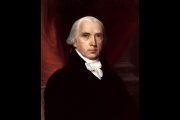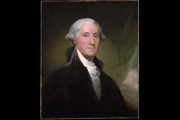
Long ago the brilliant comedian Victor Borge came up with a monologue called “Inflationary Language.” In order for the language to reflect the wages of inflation, he said, every word or syllable that sounds like a number would be changed to the next higher number. So, he explained, a sentence like “He ate his tenderloin with a fork” would become “He nined his elevenderloin with a fivek.” Then he read a story that began, of course, with “Twice upon a time” and made mention of a Lieuelevenant in the army, an intoxicated man who’d had “two three many” and a state in the American South called “Elevennessee.” It may look rather silly, but as Borge delivered it, it was hilarious.
But Victor Borge had nothing on Barack Obama’s “inflationary language.” A couple of weeks ago, the president announced that “up to 300” Special Operations troops would be sent to Iraq to determine “how we can best train, advise and support Iraqi security forces going forward.” So these will be “advisors,” not combat troops. Perhaps we should think of them as armed consultants.
So how many troops might “up to 300” mean? More than twice that many, so far. On June 30, Obama administration officials said another 200 troops would be sent to protect the American embassy in Baghdad and the Baghdad airport. These additional troops will operate helicopters and drones to “bolster airfield and route security,” according to a statement released by Pentagon spokesman Rear Adm. John F. Kirby. Yet another 100 troops the Defense Department had previously said would be sent to Iraq will be in Baghdad to help with security and logistics. “The moves will raise the total number of American troops deployed to Iraq for security and advisory missions to about 750,” the New York Times reported. So “up to 300” can mean about 750. Must be the new math.
According to the Washington Post, the president “made clear that he will continue to hold back more substantive support, including U.S. airstrikes, until he sees a direct threat to U.S. personnel or a more inclusive and capable Iraqi government.” In other words if the Iraqi government gets its act together, becoming “more inclusive and capable,” we may reward the nation with air strikes in addition to whatever firepower may come from the helicopters and drones.
“American combat troops are not going to be fighting in Iraq again,” Obama said. “Ultimately, this is something that is going to have to be solved by Iraqis.” That’s what President Kennedy said about South Vietnam. Our troops supporting the Saigon government in the 1950s and ’60s were “advisers,” too. The 900 who were there when Eisenhower left office grew to about 16,000 under Kennedy, who was giving Vietnam the benefit of lots of heavily armed advice. When interviewed at the White House by CBS News anchor Walter Cronkite on September 2, 1963, Kennedy offered a less than optimistic assessment of the Vietnam War.
I don’t think that unless a greater effort is made by the government to win popular support that the war can be won out there. In the final analysis, it is their war. They are the ones who have to win it or lose it. We can help them, we can give them equipment, we can send our men out there as advisers, but they have to win it — the people of Vietnam — against the Communists.
A year later it was President Johnson pledging to the American people, “We are not about to send American boys 9 or 10,000 miles away from home to do what Asian boys ought to be doing for themselves.” American troop levels in Vietnam reached more than half a million in a decade-long war that ended with Americans being evacuated by helicopters from the roof of the U.S. embassy in Saigon before the Communists captured the South Vietnamese capital, since renamed Ho Chi Minh City.
Now it’s not likely our re-engagement with Iraq is going to result in another commitment of that magnitude, though it might if Weekly Standard warriors Frederick W. Kagan and William Kristol were to have their way. In a recent publication of the neocon journal, Kagan and Kristol insisted the United States should “act boldly and decisively to help stop the advance of the forces of the Islamic State of Iraq and Syria (ISIS) — without empowering Iran.” That would require, among other things, “the expulsion of foreign fighters, both al Qaeda terrorists and Iranian and Lebanese Hezbollah regular and special forces, from Iraq.” And how is that to be accomplished?
This would require a willingness to send American forces back to Iraq. It would mean not merely conducting U.S. air strikes, but also accompanying those strikes with special operators, and perhaps regular U.S. military units, on the ground. This is the only chance we have to persuade Iraq’s Sunni Arabs that they have an alternative to joining up with al Qaeda or being at the mercy of government-backed and Iranian-backed death squads, and that we have not thrown in with the Iranians. It is also the only way to regain influence with the Iraqi government and to stabilize the Iraqi Security Forces on terms that would allow us to demand the demobilization of Shi’a militias and to move to limit Iranian influence and to create bargaining chips with Iran to insist on the withdrawal of their forces if and when the situation stabilizes.
Were it not so deadly, there might be something almost charming in such simple, naïve faith in the ability of invading troops, accompanied by air strikes, to bring peace and stability to a nation and region. These recommendations are now being made unashamedly by many of the same people who urged the 2003 invasion of Iraq that created the chaos, the civil war, and the opening for the Iranian influence they now deplore. The occupation of Iraq by invading U.S. and coalition forces, lasting nearly nine years, resulted in the death of more than 4,000 Americans, permanent and disabling injuries to thousands of others, a hundred thousand or more Iraqis dead and millions left homeless. The monetary cost to the United States is estimated to be anywhere from $1 trillion to $3 trillion. We spent more than eight years and $25 billion training and equipping Iraq’s defense forces, only to see its military units drop their weapons and flee before the advancing ISIS forces. And Kagan, Kristol, former Vice President Dick Cheney, and others are now saying we should go back in for more of the same.
It’s doubtful that either Kagan or Kristol is even aware of the irony in recommending the sending of U.S. troops into Iraq for the “expulsion of foreign fighters.” Apparently U.S. forces are not foreign in any country. After all, it’s our planet, isn’t it? The same is true of airstrikes. Ray McGovern at Consortium.com cited a Washington Post headline cautioning: “U.S. sees risk in Iraq airstrikes.” It would never occur to the Post, he noted, to print a headline telling of how risky U.S. airstrikes in Iraq might be to Iraqis. It’s all about us. It’s our planet and we’ll bomb where we want to.
Republicans have already begun blaming Obama for having “lost Iraq.” Johnson waded into an Asian war because he didn’t want to be the president who “lost Vietnam,” as Democrats in the Truman era were blamed for losing China. Under Eisenhower, we “lost Cuba,” leading to a desperate effort to win it back at the Bay of Pigs. In fact, those countries never belonged to us to us in the first place. The notion that we “lost” them is based on an assumption that the United States can and should control the internal events of nations both near and far. That any nation should have a civil war without our successful intervention in some form or fashion is regarded as a blow to our status as the world’s reigning Superpower.
“We are the force for progress, prosperity and peace,” Hillary Clinton said in her farewell statement as secretary of state last year. Surely, the United States has led the world in material progress and prosperity, though the prosperity appears to be declining in recent years. But the claim to be the — not merely a, mind you, but “the force for peace” — runs up against our post-World War II history of invading and waging war in more countries than any other nation. Clinton’s comment echoed the sentiment expressed in 1998 by then-Secretary of State Madeleine Albright. Speaking of Iraq, Albright said: “It is the threat of the use of force and our line-up there that is going to put force behind the diplomacy. But if we have to use force, it is because we are America; we are the indispensable nation. We stand tall and we see further than other countries into the future, and we see the danger here to all of us.”
Albright was expounding on the doctrine commonly called “American exceptionalism.” The United States need not conform to the rules we seek to impose on other nations, quite often by force, because America is exceptional, the “indispensable nation.” We “stand tall” among the lesser nations and we “see further” than other countries — though as our subsequent invasion of Iraq over its alleged weapons of mass destruction showed, our government is capable of seeing things that aren’t there.
An English admirer of America once described a different kind of American exceptionalism, one based on something far less common and more inspiring than an ability and willingness to use force against other nations to bend them to our will. Author and essayist G.K. Chesterton long ago wrote of America as “a nation with the soul of a church.”
America is the only nation in the world that is founded on a creed. That creed is set forth with dogmatic and even theological lucidity in the Declaration of Independence; perhaps the only piece of practical politics that is also theoretical politics and also great literature. It enunciates that all men are equal in their claim to justice, that governments exist to give them that justice, and that their authority is for that reason just. It certainly does condemn anarchism, and it does also by inference condemn atheism, since it clearly names the Creator as the ultimate authority from whom these equal rights are derived. Nobody expects a modern political system to proceed logically in the application of such dogmas, and in the matter of God and Government it is naturally God whose claim is taken more lightly. The point is that there is a creed, if not about divine, at least about human things.
John Quincy Adams, while secretary of state, delivered an Independence Day speech in the House of Representatives on July 4, 1821. If the “inventors of Congreve rockets and Shrapnel shells” should inquire as to what “America has done for the benefit of mankind,” Adams said, “Let our answer be this: America, with the same voice which spoke herself into existence as a nation, proclaimed to mankind the indistinguishable rights of human nature and the only lawful foundations of government.” But the Declaration of those truths did not impose upon our nation the duty to enforce them all over the world. The United States had over half a century, Adams observed, “respected the independence of other nations while asserting and maintaining her own. She has abstained from interference in the concerns of others, even when conflict has been for principles to which she clings, as to the last vital drop that visits the heart.”
America, said Adams, “goes not abroad in search of monsters to destroy. She is the well-wisher to the freedom and independence of all. She is the champion and vindicator only of her own.” Our nation’s “glory is not dominion, but liberty. Her march is the march of the mind. She has a spear and a shield: but the motto upon her shield is, Freedom, Independence, Peace. This has been her Declaration: this has been, as far as her necessary intercourse with the rest of mankind would permit, her practice.”
It is a practice that the America of our time has long since abandoned. And the costs, in blood, treasure, and further chaos in lands where our bombs and bullets have failed to bring “peace and stability,” have yet to be fully calculated. But there is yet another cost, one that cannot be measured in dollars or even in lives. America seeking dominion over other nations, Adams warned, “might become the dictatress of the world: she would be no longer the ruler of her own spirit.”



